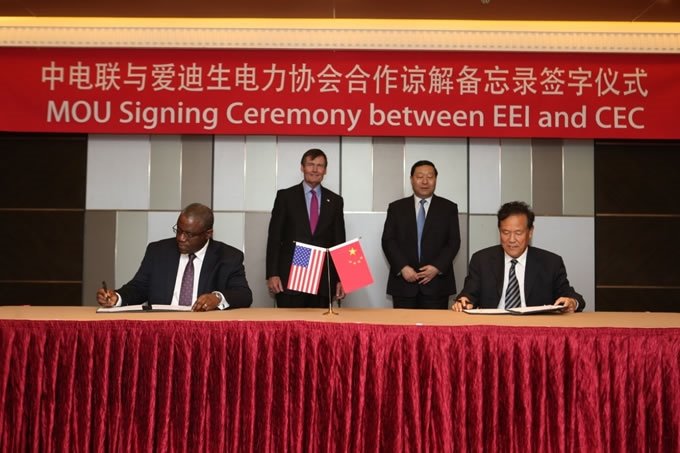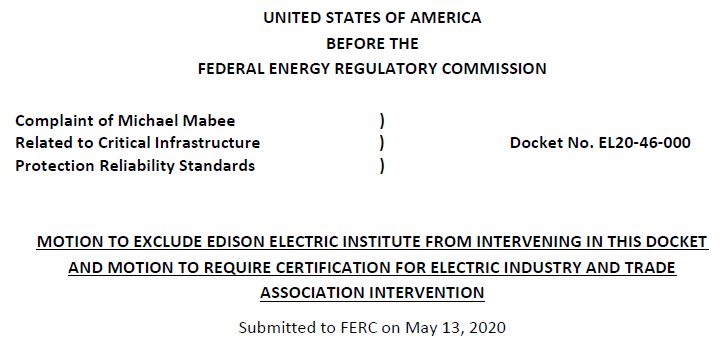Electric Industry Lobbyist’s China Ties Questioned

Below is formal correspondence from Secure the Grid Coalition member Michael Mabee to the Federal Energy Regulatory Commission (FERC) demonstrating the very worrisome relationship between the nation’s biggest grid lobbying organization and Communist China
Photo Source: Edison Electric Institute

I am the Complainant in this docket. I file these two motions pursuant to 18 CFR § 385.212 (Rule 212).
Background
On May 4, 2020, the President of the United States declared a national emergency and issued Executive Order 13920: “Securing the United States Bulk-Power System.”[1] The order defines:
The term “foreign adversary” means any foreign government or foreign non-government person engaged in a long-term pattern or serious instances of conduct significantly adverse to the national security of the United States or its allies or the security and safety of United States persons.
The Government of the People’s Republic of China has long been viewed as a foreign adversary of the United States. Specifically, in 2019 the Director of National Intelligence stated:[2]
Our adversaries and strategic competitors will increasingly use cyber capabilities—including cyber espionage, attack, and influence—to seek political, economic, and military advantage over the United States and its allies and partners. China, Russia, Iran, and North Korea increasingly use cyber operations to threaten both minds and machines in an expanding number of ways—to steal information, to influence our citizens, or to disrupt critical infrastructure.
The director of National Intelligence also stated:
China presents a persistent cyber espionage threat and a growing attack threat to our core military and critical infrastructure systems. China remains the most active strategic competitor responsible for cyber espionage against the US Government, corporations, and allies. It is improving its cyber attack capabilities and altering information online, shaping Chinese views and potentially the views of US citizens—an issue we discuss in greater detail in the Online Influence Operations and Election Interference section of this report.
-
- Beijing will authorize cyber espionage against key US technology sectors when doing so addresses a significant national security or economic goal not achievable through other means. We are also concerned about the potential for Chinese intelligence and security services to use Chinese information technology firms as routine and systemic espionage platforms against the United States and allies.
- China has the ability to launch cyber attacks that cause localized, temporary disruptive effects on critical infrastructure—such as disruption of a natural gas pipeline for days to weeks—in the United States.
Edison Electric Institute’s Ties to a Foreign Adversary as Defined in Executive Order 13920.
Edison Electric Institute (EEI) is the trade organization that purports to represent “all U.S. investor-owned electric companies.”[3] EEI is a frequent intervenor and commenter in FERC dockets related to Critical Infrastructure Protection (CIP) standards and issues.[4] EEI spends millions of dollars annually lobbying the U.S. Congress on matters pertaining to the U.S. Critical infrastructure.[5] EEI also makes contributions to key members of Congress involved in critical infrastructure security legislation.[6]
Attached as Exhibit A is EEI’s member list, dated February 2020 which I downloaded from EEI’s website on May 10, 2020.[7] EEI counts among its members State Grid Corporation of China, which is a state-owned corporation, owned by the government of the People’s Republic of China. EEI also counts as a member Power Assets Holdings, a company based in Hong Kong (which China calls “Hong Kong Special Administrative Region of the People’s Republic of China”).
Attached as Exhibit B is EEI’s member list dated February 2020 which I downloaded from EEI’s website on April 10, 2020. In this version, EEI counted among its members State Grid Corporation of China as well as China Southern Power Grid Co. Both of these are state-owned entities, owned by the government of the People’s Republic of China. EEI also counts as a member Power Assets Holdings, a company based in Hong Kong (which China calls “Hong Kong Special Administrative Region of the People’s Republic of China”).
Attached as Exhibit C is EEI’s member list dated May 2019 which I downloaded from EEI’s website on May 29, 2019. In this version, EEI counted among its members State Grid Corporation of China as well as China Southern Power Grid Co. Both of these are state-owned entities, owned by the government of the People’s Republic of China. EEI also counts as a member Power Assets Holdings, a company based in Hong Kong (which China calls “Hong Kong Special Administrative Region of the People’s Republic of China”).
These three Chinese companies have an obligation under the 2017 Chinese National Intelligence Law to “support, assist and cooperate with the state intelligence work.” Moreover, under China’s 2014 Counter-Espionage Law[8] a company may not refuse the Chinese government when asked for information. In fact, according Dr. Murray Scot Tanner’s Lawfare Institute analysis:[9]
“The Intelligence Law, by contrast, repeatedly obliges individuals, organizations, and institutions to assist Public Security and State Security officials in carrying out a wide array of ‘intelligence’ work. Article Seven stipulates that ‘any organization or citizen shall support, assist, and cooperate with state intelligence work according to law.’ Article 14, in turn, grants intelligence agencies authority to insist on this support: ‘state intelligence work organs, when legally carrying forth intelligence work, may demand that concerned organs, organizations, or citizens provide needed support, assistance, and cooperation.’ Organizations and citizens must also protect the secrecy of ‘any state intelligence work secrets of which they are aware’.”
So, at least three members or former members of the Edison Electric Institute have an obligation to provide information and assistance to the government of the People’s Republic of China.
In other words, the government of the People’s Republic China—the very government that has been hacking the North American electric grid for years—is, a for all intents and purposes, a member of Edison Electric Institute through its state owned corporations and other entities that owe their allegiance and obligations to the PRC.
Moreover, Chinese companies have been “affiliates” of EEI since at least 2014,[10] and State Grid Corporation of China has been a member of EEI since at least 2016.[11] Exhibit D is EEI’s February 2016 Member List.
The relationship seems far from casual: Exhibit E is the EEI’s press release on June 6, 2018 when EEI awarded State Grid Corporation of China “Edison Electric Institute’s (EEI’s) 2018 International Edison Award.”[12]
Exhibit F is a press release from the State-owned Assets Supervision and Administration Commission of the State Council (SASAC) announcing State Grid Corporation of China’s receipt of the EEI “Edison Award.”[13] Note that the SASAC “is an ad-hoc ministerial-level organization directly subordinated to the State Council. The Party Committee of SASAC performs the responsibilities mandated by the Central Committee of the Chinese Communist Party.”[14]
Exhibit G is a press release from the China Electricity Council (CEC)[15] announcing that EEI and the China Electricity Council (whose “President Member” is the State Grid Corporation of China[16]) entered into a formal “memorandum of understanding” (MOU).
Exhibit H is EEI’s press release on this MOU between EEI and the China Electricity Council.[17] This picture is included in EEI’s press release:

While Edison Electric Institute may be free to have whomever it wishes as members, associates and awardees, it is not in the public interest for an organization with such ties to a foreign adversary, as defined in Executive Order 13920, to intervene in a docket involving issues of U.S. national security.
Motion to Exclude Edison Electric Institute from Intervening in this Docket
For the reasons above, FERC should EXCLUDE Edison Electric Institute from Intervention in this docket due to their membership including a foreign adversary as defined in Executive Order 13920 and their affiliations with entities controlled by a foreign adversary as defined in Executive Order 13920.
Motion to Require Certification for Electric Industry and Trade Association Intervention
For the reasons above, FERC should require that any trade organization or investor owned utility wishing to intervene in this docket certify that it has no affiliation, members, interests or shareholders who are entities or governments that are a foreign adversary as defined in Executive Order 13920.
Respectfully submitted,
Michael Mabee
Attachments: Exhibits A through H
Click HERE for Underlying Complaint
Footnotes:
[1] Available at: https://www.govinfo.gov/content/pkg/FR-2020-05-04/pdf/2020-09695.pdf (Accessed May 10, 2020).
[2] Coats, Daniel R. Director of National Intelligence (DNI) “Worldwide Threat Assessment of the U.S. Intelligence Community” Senate Select Committee on Intelligence. January 29, 2019. Available at: https://www.dni.gov/files/ODNI/documents/2019-ATA-SFR—SSCI.pdf (Accessed May 10, 2020).
[3] See: https://www.eei.org/about/Pages/default.aspx (accessed May 10, 2020).
[4] See, for example, FERC Dockets EL20-21-000, AD19-18-000, RM15-14-000 and NP19-4-000.
[5] See: https://www.opensecrets.org/federal-lobbying/clients/summary?cycle=2018&id=D000000297 (accessed May 10, 2020).
[6] See: https://www.opensecrets.org/pacs/pacgot.php?cycle=2018&cmte=C00095869 (accessed May 10, 2020).
[7] Downloaded on May 10, 2020 from https://www.eei.org/about/members/uselectriccompanies/Documents/memberlist_print.pdf
[8] https://www.reuters.com/article/us-china-lawmaking-spy-idUSKBN0IL2N520141101 (accessed May 10, 2020).
[9] https://www.lawfareblog.com/beijings-new-national-intelligence-law-defense-offense (accessed May 10, 2020).
[10] See EEI’s website on February 14, 2014 archived at: https://web.archive.org/web/20140214141920/http://www.eei.org/about/members/internationalaffiliates/Pages/interaffiliatelist.aspx (accessed May 10, 2020).
[11] See EEI’s website on October 11, 2016 archived at: https://web.archive.org/web/20161011162447/http:/www.eei.org/about/members/internationalaffiliates/Pages/interaffiliatelist.aspx (accessed May 10, 2020).
[12] Also available at: http://www.eei.org/resourcesandmedia/newsroom/Pages/Press Releases/State Grid Corporation of China Wins EEI’s 2018 International Edison Award0606-2042.aspx (accessed May 10, 2020).
[13] Also available at: http://en.sasac.gov.cn/2018/06/07/c_98.htm (accessed May 11, 2020).
[14] See: http://en.sasac.gov.cn/aboutus.html (accessed May 11, 2020).
[15] Also available at: http://english.cec.org.cn/No.105.1619.htm (accessed May 10, 2020).
[16] See: http://english.cec.org.cn/No.86.index.htm (accessed May 11, 2020).
[17] Also available at: https://www.eei.org/resourcesandmedia/energynews/Pages/EEI%20and%20China%20Electricity%20Council%20Sign%20MOU.aspx (accessed May 10, 2020).
